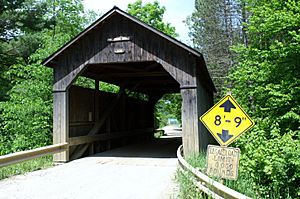Pine Brook Covered Bridge facts for kids
Quick facts for kids Pine Brook Covered Bridge |
|
|---|---|

Bridge in U.S. state of Vermont
|
|
| Carries | North Road |
| Crosses | Pine Brook |
| Locale | Waitsfield, Vermont |
| Maintained by | Town of Waitsfield |
| ID number | VT-12-12 |
| Characteristics | |
| Design | Covered, King post |
| Material | Wood |
| Total length | 48.5 ft (14.78 m) |
| Width | 14.1 ft (4.30 m) |
| Number of spans | 1 |
| Load limit | 5 tons |
| Clearance above | 8.75 ft (2.67 m) |
| History | |
| Constructed by | unknown |
| Construction end | 1872 |
|
U.S. Historic district
Contributing property |
|
| Area | 1 acre (0.4 ha) |
| Part of | Mad River Valley Rural Historic District (ID94000836) |
| NRHP reference No. | 74000264 |
| Significant dates | |
| Added to NRHP | June 13, 1974 |
| Designated CP | August 5, 1994 |
The Pine Brook Covered Bridge is a cool old wooden bridge in Waitsfield, Vermont. People also call it the Wilder Covered Bridge. It crosses a small stream called Pine Brook on North Road. This bridge was built way back in 1872. It's special because it's one of only two covered bridges from the 1800s still standing in Waitsfield! In 1974, it was added to the National Register of Historic Places, which means it's an important historical spot.
Contents
What Makes This Bridge Special?
The Pine Brook Bridge is in a quiet, country part of northern Waitsfield. It helps North Road cross Pine Brook, which flows into the Mad River. This bridge is about 48 feet (15 m) long and 17.5 feet (5.3 m) wide. It has one lane for cars, about 14.5 feet (4.4 m) wide.
How the Bridge Was Built
The bridge uses a special design called a king post truss. This design uses strong wooden beams that form triangles to support the bridge. It's one of only two bridges in Vermont with this specific design that are still standing from the 1800s.
The bridge sits on stone supports called abutments. These supports have concrete on them to make them even stronger. Underneath the wooden road, there are steel I-beams. These are like strong metal girders that help hold up the bridge deck.
What It Looks Like
The outside of the bridge is covered with vertical wooden boards. These boards also go a little bit inside the openings where cars drive through, called portals. The roof of the bridge is made of metal sheets that stand up, which helps water run off easily.
History and Repairs
The Pine Brook Covered Bridge was built in 1872. It's one of only two historic covered bridges in Waitsfield. The other one is the Great Eddy Covered Bridge.
Over the years, the bridge has needed some care. In 1976, it was getting old and worn out, so workers made repairs. They added concrete tops to the stone supports. They also put in those strong steel I-beams under the deck. These beams are there to help support the bridge if a very heavy load crosses it. The wooden truss parts also got fixed up. Later, in 1989, the entire wooden road surface was replaced.
 | Aaron Henry |
 | T. R. M. Howard |
 | Jesse Jackson |



